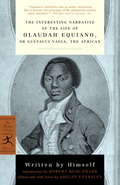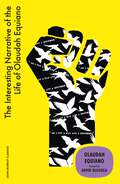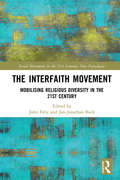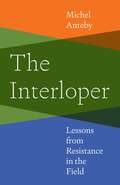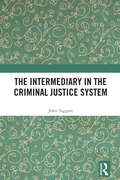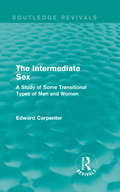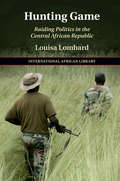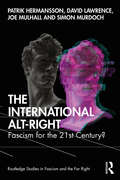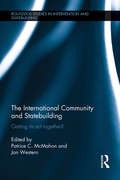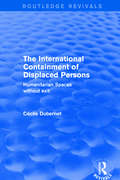- Table View
- List View
The Interesting Narrative and Other Writings: Revised Edition
by Olaudah EquianoAn exciting and often terrifying adventure story, as well as an important precursor to such famous nineteenth-century slave narratives as Frederick Douglass's autobiographies, Olaudah Equiano's Narrative recounts his kidnapping in Africa at the age of ten, his service as the slave of an officer in the British Navy, his ten years of labor on slave ships until he was able to purchase his freedom in 1766, and his life afterward as a leading and respected figure in the antislavery movement in England. A spirited autobiography, a tale of spiritual quest and fulfillment, and a sophisticated treatise on religion, politics, and economics, The Interesting Narrativeis a work of enduring literary and historical value.
The Interesting Narrative of Olaudah Equiano: The Black History Classic (Capstone Classics)
by Olaudah EquianoDISCOVER THE INDIGNITIES AND REALITIES OF SLAVERY FROM A CAPTIVATING FIRST-HAND NARRATIVEOlaudah Equiano’s interesting narrative is an astonishing first-hand account of kidnapping, enslavement and eventual emancipation that has horrified and enlightened readers for over 200 years. The Interesting Narrative of Olaudah Equiano is a seminal work in a genre that seeks to help us better shape the present by understanding our violent past.An insightful Introduction from Atlantic slave trade expert Michael Taylor sheds light on Equiano’s life, including his spiritual conversion, his wide travels, and the impact of his writing on the eventual abolition of slavery.
The Interesting Narrative of the Life of Olaudah Equiano
by Olaudah EquianoA remarkable account of early slavery and later freedom, "The Interesting Narrative of the Life of Olaudah Equiano" is the 1789 autobiography of former slave Olaudah Equiano. His life is a tale of terror, as well as an exciting adventure. He tells of his abduction from Africa at the age of ten, and his subsequent years of labor on slave ships. During and after this time, he fervently attempts to gain independence: he studies the Bible and carefully saves his money. After surviving a decade in this way, Equiano is able to purchase his own freedom in 1766. What follows is his success in business, in literacy, and in his outspoken condemnation of the slave trade. Considered an admirable precursor to such slave narratives as that of Frederick Douglass, Equiano's degraded youth and respected later life in England is told with verve and sophistication in this spirited quest for fulfillment.
The Interesting Narrative of the Life of Olaudah Equiano
by Olaudah EquianoWITH A FOREWORD BY DAVID OLUSOGAThis is the extraordinary story of Olaudah Equiano: Child slave. Soldier. Free man. Traveller. Abolitionist. Celebrity. Kidnapped as a child into slavery, Equiano spent the rest of his life fighting for his freedom. After years of slavery, working on ships that carried him across empire and into battle during the Seven Years War, he eventually managed to purchase his own freedom, and went on to become a leading figure in the early abolition movement.Published to coincide with the first attempt to abolish the slave trade in 1789, Equiano's remarkable autobiography became a sensation and turned its author into the most famous Black person in Georgian Britain. As vivid and powerful today as it was in 1789, Equiano's story is the most significant autobiographical account of slavery to emerge from Britain's centuries as a slave trading power. In this JM Classics edition, leading historian David Olusoga's introduction sets Equiano's book in its historical context, helping us to understand the man himself.
The Interesting Narrative of the Life of Olaudah Equiano
by Olaudah EquianoWITH A FOREWORD BY DAVID OLUSOGAThis is the extraordinary story of Olaudah Equiano: Child slave. Soldier. Free man. Traveller. Abolitionist. Celebrity. Kidnapped as a child into slavery, Equiano spent the rest of his life fighting for his freedom. After years of slavery, working on ships that carried him across empire and into battle during the Seven Years War, he eventually managed to purchase his own freedom, and went on to become a leading figure in the early abolition movement.Published to coincide with the first attempt to abolish the slave trade in 1789, Equiano's remarkable autobiography became a sensation and turned its author into the most famous Black person in Georgian Britain. As vivid and powerful today as it was in 1789, Equiano's story is the most significant autobiographical account of slavery to emerge from Britain's centuries as a slave trading power. In this JM Classics edition, leading historian David Olusoga's introduction sets Equiano's book in its historical context, helping us to understand the man himself.
The Interesting Narrative of the Life of Olaudah Equiano, or Gustavus Vassa, the African, Written by Himself (Norton Critical Editions)
by Olaudah Equiano Werner SollorsChosen by the Guardian as one of the one hundred best nonfiction books of all time, Olaudah Equiano’s searing first-person account helped awaken contemporary readers to the nightmare of slavery. <p><p> Olaudah Equiano begins his memoir with reflections on his childhood in West Africa - but that discussion ends abruptly as Equiano and his sister are kidnapped, separated, and sold into bondage. Subsequent sales take Equiano across the Atlantic Ocean to Bermuda, then out to sea, and then back across the Atlantic to England. As a result, Equiano is able to testify to the unfathomable cruelties of eighteenth-century slavery at many stages, including the journey across the Middle Passage, life on a plantation, and the quest for self-emancipation. Equiano eventually purchases his freedom and achieves some success, but his narrative stands as a clear-eyed testimony against the institution of slavery - one that also played an important role in enlisting readers all over the world in the cause of abolition.
The Interesting Narrative of the Life of Olaudah Equiano: With a foreword by David Olusoga
by Olaudah EquianoEquiano's narrative is the most significant autobiographical account of slavery to emerge from Britain's centuries as a slave trading and slave owning power. It remains as powerful today as it was when first published in 1789.It tells the story of Equiano's remarkable life, recounting his years of slavery, working on ships that carried him across the empire and into battle during the Seven Years War, and the extraordinary story of how he was able to purchase his own freedom. Travelling to Britain as a free man Equiano settled in London and there became a leading figure in the early abolition movement.The publication of his narrative was carefully timed to coincide with the first attempt to abolish the slave trade. Describing his own experiences of slavery as both victim and witness, the book became a sensation and its author the most famous black person in Georgian Britain.In this new edition, leading historian David Olusoga sets the book in its historical context helping us to understand this complex, spiritual, politically astute and deeply passionate man. Although Equiano did not live to see the abolition of the slave trade or slavery his voice was critical to that that long campaign.
The Interesting Narrative of the Life of Olaudah Equiano: With a foreword by David Olusoga
by Olaudah EquianoEquiano's narrative is the most significant autobiographical account of slavery to emerge from Britain's centuries as a slave trading and slave owning power. It remains as powerful today as it was when first published in 1789.It tells the story of Equiano's remarkable life, recounting his years of slavery, working on ships that carried him across the empire and into battle during the Seven Years War, and the extraordinary story of how he was able to purchase his own freedom. Travelling to Britain as a free man Equiano settled in London and there became a leading figure in the early abolition movement.The publication of his narrative was carefully timed to coincide with the first attempt to abolish the slave trade. Describing his own experiences of slavery as both victim and witness, the book became a sensation and its author the most famous black person in Georgian Britain.In this new edition, leading historian David Olusoga sets the book in its historical context helping us to understand this complex, spiritual, politically astute and deeply passionate man. Although Equiano did not live to see the abolition of the slave trade or slavery his voice was critical to that that long campaign.
The Interesting Narrative of the Life of Olaudah Equiano: With a foreword by David Olusoga
by Olaudah EquianoThe classic memoir of an 18th-century British former slave, and leading figure in the abolitionist movement, Olaudah Equiano. Introduced by David Olusoga, author of the highly acclaimed Black and British.Kidnapped and sold into slavery at the age of ten, Olaudah Equiano's memoir caused a sensation when it was first published in 1789. The Interesting Narrative of the Life of Olaudah Equiano is the true story of his life, from his ten years of service as a slave in the British Navy to his experiences - after having purchased his freedom twice - as a freed black man living in eighteenth-century England. Equiano would go on to be a leading figure in the anti-slavery movement, boosted by the success of his memoir, which became a bestseller and went through nine editions in his lifetime.This new edition of the landmark memoir features a foreword by historian and bestselling author David Olusoga (Black and British), bringing this long-overlooked classic back into the spotlight, and showing his importance, which has been too often neglected, for the story of the abolition of slavery in Britain.(P) 2021 Hodder & Stoughton Limited
The Interface of Competition Law, Industrial Policy and Development Concerns: The Case of South Africa (Munich Studies on Innovation and Competition #8)
by Balthasar StrunzThis book analyses essential concepts of competition law and industrial policy, and shows where the two areas clash with and complement each other, respectively. The discussion takes place in the context of developing countries, taking into consideration their realities and specific needs. South Africa serves as a real-world example for competition law that goes beyond the notion of consumer welfare. An in-depth analysis of the enforcement of South African law illustrates how the law is used both to combat the negative effects of past industrial policy, and to accommodate current economic and social needs.The book is intended for all readers with an interest in the enforcement of competition law in developing countries. It will particularly benefit those who want to learn about unorthodox approaches that integrate the concept of “public interest” and social imperatives into the application of competition law.
The Interfaith Movement: Mobilising Religious Diversity in the 21st Century (Social Movements in the 21st Century: New Paradigms)
by John Fahy Jan-Jonathan BockAlthough its beginnings can be traced back to the late 19th century, the interfaith movement has only recently begun to attract mainstream attention, with governments, religious leaders and grassroots activists around the world increasingly turning to interfaith dialogue and collective action to address the challenges posed and explore the opportunities presented by religious diversity in a globalising world. This volume explores the history and development of the interfaith movement by engaging with new theoretical perspectives and a diverse range of case studies from around the world. The first book to bring together experts in the fields of religion, politics and social movement theory to offer an in-depth social analysis of the interfaith movement, it not only sheds new light on the movement itself, but challenges the longstanding academic division of labour that confines ‘religious’ and ‘social’ movements to separate spheres of inquiry.
The Interloper: Lee Harvey Oswald Inside the Soviet Union
by Peter SavodnikLee Harvey Oswald’s assassination of President Kennedy in 1963 remains one of the most horrifying and hotly debated crimes in American history. Just as perplexing as the assassination is the assassin himself; the 24-year-old Oswald’s hazy background and motivations#151;and his subsequent murder at the hands of Jack Ruby#151;make him an intriguing yet frustratingly enigmatic figure. Because Oswald briefly defected to the Soviet Union, some historians allege he was a Soviet agent. But as Peter Savodnik shows in The Interloper, Oswald’s time in the U. S. S. R. reveals a stranger, more chilling story. Oswald ventured to Russia at the age of 19, after a failed stint in the U. S. Marine Corps and a childhood spent shuffling from address to address with his unstable, needy mother. Like many of his generation, Oswald struggled for a sense of belonging in postwar American society, which could be materialistic, atomized, and alienating. The Soviet Union, with its promise of collectivism and camaraderie, seemed to offer an alternative. While traveling in Europe, Oswald slipped across the Soviet border, soon settling in Minsk where he worked at a radio and television factory. But Oswald quickly became just as disillusioned with his adopted country as he had been with the United States. He spoke very little Russian, had difficulty adapting to the culture of his new home, and found few trustworthy friends; indeed most, it became clear, were informing on him to the KGB. After nearly three years, Oswald returned to America feeling utterly defeated and more alone than ever#151;and as Savodnik shows, he began to look for an outlet for his frustration and rage. Drawing on groundbreaking research, including interviews with Oswald’s friends and acquaintances in Russia and the United States, The Interloper brilliantly evokes the shattered psyche not just of Oswald himself, but also of the era he so tragically defined.
The Interloper: Lessons from Resistance in the Field
by Michel AntebyA practical and theoretical guide for field researchers struggling with accessResistance is the bane of all field researchers, who are often viewed as interlopers when they enter a community and start asking questions. People obstruct investigations and hide evidence. They shelve complaints, silence dissent, and even forget their own past and deny having done so. How can we learn about a community when its members resist so strongly? The answer is that the resistance itself is sometimes the key.Michel Anteby explains how community members often disclose more than intended when they close ranks and create obstacles. He draws insights from diverse stories of resistance by uncooperative participants—from Nazi rocket scientists and Harvard professors to Disney union busters and people who secure cadavers for medical school dissection—to reveal how field resistance manifests itself and how researchers can learn from it. He argues that many forms of resistance are retrospectively telling, and that these forms are the routine products, not by-products, of the field. That means that resistance mechanisms are not only indicative of something else happening; instead, they often are the very data points that can shed light on how participants make sense of their worlds.An essential guide for ethnographers, sociologists, and all field researchers seeking access, The Interloper shares practical and theoretical insights into the value of having the door slammed in your face.
The Interlopers: Early Stuart Projects and the Undisciplining of Knowledge
by Vera KellerA reframing of how scientific knowledge was produced in the early modern world.Many accounts of the scientific revolution portray it as a time when scientists disciplined knowledge by first disciplining their own behavior. According to these views, scientists such as Francis Bacon produced certain knowledge by pacifying their emotions and concentrating on method. In The Interlopers, Vera Keller rejects this emphasis on discipline and instead argues that what distinguished early modernity was a navigation away from restraint and toward the violent blending of knowledge from across society and around the globe.Keller follows early seventeenth-century English "projectors" as they traversed the world, pursuing outrageous entrepreneurial schemes along the way. These interlopers were developing a different culture of knowledge, one that aimed to take advantage of the disorder created by the rise of science and technological advances. They sought to deploy the first submarine in the Indian Ocean, raise silkworms in Virginia, and establish the English slave trade. These projectors developed a culture of extreme risk-taking, uniting global capitalism with martial values of violent conquest. They saw the world as a riskscape of empty spaces, disposable people, and unlimited resources.By analyzing the disasters—as well as a few successes—of the interlopers she studies, Keller offers a new interpretation of the nature of early modern knowledge itself. While many influential accounts of the period characterize European modernity as a disciplining or civilizing process, The Interlopers argues that early modernity instead entailed a great undisciplining that entangled capitalism, colonialism, and science.
The Intermediaries: A Weimar Story
by Brandy SchillaceThe fascinating history of a daring team of sexologists who built the first trans clinic in the shadow of the Third Reich. Set in interwar Germany, The Intermediaries tells the forgotten story of the Institute for Sexual Science, the world’s first center for homosexual and transgender rights. Headed by a gay Jewish man, Dr. Magnus Hirschfeld, the institute aided in the first gender-affirming surgeries and hormone treatments, acting as a rebellious base of operations in the face of rising prejudice, nationalism, and Nazi propaganda. An expert in medical history, Brandy Schillace tells the story of the Institute through the eyes of Dora Richter, an Institute patient whom we follow in her quest to transition and live as a woman. While the colorful but ultimately tragic arc of Weimar Berlin is well documented, The Intermediaries is the first book to assert the inseparable, interdependent relationship of sex science to both the queer rights movement and the permissive Weimar culture, tracking how political factions perverted that same science to suit their own ends. This riveting book brings together forgotten scientific and surgical discoveries (including previously untranslated archival material from Berlin) with the politics and social history that galvanized the first stirrings of the trans rights movement. Through its unforgettable characters and immersive, urgent storytelling, The Intermediaries charts the relationships between nascent sexual science, queer civil rights, and the fight against fascism. It tells riveting stories of LGBTQ pioneers—a surprising, long-suppressed history—and offers a cautionary tale in the face of today’s oppressive anti-trans legislation.
The Intermediary in the Criminal Justice System
by John TaggartThis book undertakes a sociolegal examination of the intermediary role within the criminal justice system.The intermediary special measure is one of the most innovative and controversial developments in the history of English criminal procedure. But what does the role actually involve? That is the central question explored in this book. Despite increased academic attention into this new criminal justice actor, the content of the intermediary role remains unclear. Based centrally on empirical data gathered in England and Wales and Northern Ireland, but also drawing upon comparative material from other jurisdictions, the book examines how those executing the intermediary role understand its work and how other criminal justice actors perceive it. The book then uses this as the basis for generating a theory of the intermediary role and its scope and content. It also considers the future of the role and its integration into the criminal justice system.This book will appeal to those researching and studying in the areas of sociolegal studies, criminal law and criminology, as well as lawyers, judges, intermediaries and policy makers working in relevant areas.
The Intermediate Sex: A Study of Some Transitional Types of Men and Women (Routledge Revivals: The Collected Works of Edward Carpenter)
by Edward CarpenterThe Intermediate sex collates papers from Edward Carpenter on his ideas about intermediate types. Carpenter claims that there are those in societies who hold an intermediate position between the two sexes and may have an inner sex in their mind that is different from their biological sex. Originally published in 1908, this version in1941, these papers present early observations about gender fluidity in both men and women, studying certain ‘types’ of intermediate people that he claimed were begin to emerge more obviously at the time of writing. This title will be of interest to students of gender studies.
The International African Library: After Rape
by Holly PorterFollowing the ICC intervention in 2005, northern Uganda has been at the heart of international justice debates. The emergent controversy, however, missed crucial aspects of Acholi realities: that the primary moral imperative in the wake of wrongdoing was not punishment but, instead, the restoration of social harmony. Drawing upon abundant fieldwork and in-depth interviews with almost 200 women, Holly Porter examines issues surrounding wrongdoing and justice, and sexual violence and rape, among the Acholi people in northern Uganda. This intricate exploration offers evidence of a more complicated and nuanced explanation of rape and its aftermath, suggesting a re-imagining of the meanings of post-atrocity justice, whilst acknowledging the role of sex, power and politics in all sexual experiences between coercion and consent. With its wide investigation of social life in northern Uganda, this provocative study offers vital analysis for those interested in sexual and gender violence, post-conflict reconstruction and human rights.
The International African Library: Pioneers of the Field
by Andrew BankFocusing on the crucial contributions of women researchers, Andrew Bank demonstrates that the modern school of social anthropology in South Africa was uniquely female-dominated. The book traces the personal and intellectual histories of six remarkable women through the use of a rich cocktail of new archival sources, including family photographs, private and professional correspondence, field-notes and field diaries, published and other public writings and even love letters. The book also sheds new light on the close connections between their personal lives, their academic work and their anti-segregationist and anti-apartheid politics. It will be welcomed by anthropologists, historians and students in African studies interested in the development of social anthropology in twentieth-century Africa, as well as by students and researchers in the field of gender studies.
The International African Library: Raiding Politics In The Central African Republic (The\international African Library #61)
by Louisa LombardThe International African Library: Zimbabwe's Migrants and South Africa's Border Farms
by Maxim BoltDuring the Zimbabwean crisis, millions crossed through the apartheid-era border fence, searching for ways to make ends meet. Maxim Bolt explores the lives of Zimbabwean migrant labourers, of settled black farm workers and their dependants, and of white farmers and managers, as they intersect on the border between Zimbabwe and South Africa. Focusing on one farm, this book investigates the role of a hub of wage labour in a place of crisis. A close ethnographic study, it addresses the complex, shifting labour and life conditions in northern South Africa's agricultural borderlands. Underlying these challenges are the Zimbabwean political and economic crisis of the 2000s and the intensified pressures on commercial agriculture in South Africa following market liberalization and post-apartheid land reform. But, amidst uncertainty, farmers and farm workers strive for stability. The farms on South Africa's margins are centers of gravity, islands of residential labour in a sea of informal arrangements.
The International Alt-Right: Fascism for the 21st Century? (Routledge Studies in Fascism and the Far Right)
by David Lawrence Patrik Hermansson Joe Mulhall Simon MurdochThe alt-right has been the most important new far-right grouping to appear in decades. Written by researchers from the anti-racist advocacy group HOPE not hate, this book provides a thorough, ground-breaking, and accessible overview of this dangerous new phenomenon. It explains where the alt-right came from, its history so far, what it believes, how it organises and operates, and its future trajectory. The alt-right is a genuinely transnational movement and this book is unique in offering a truly international perspective, outlining the influence of European ideas and movements as well as the alt-right's development in, and attitude towards, countries as diverse as Japan, India, and Russia. It examines the ideological tributaries that coagulated to form the alt-right, such as white supremacy, the neo-reactionary blogosphere, the European New Right, the anti-feminist manosphere, the libertarian movement, and digital hate culture exemplified by offensive memes and trolling. The authors explore the alt-right's views on gender, sexuality and masculinity, antisemitism and the Holocaust, race and IQ, globalisation and culture as well as its use of violence. The alt-right is a thoroughly modern far-right movement that uses cutting edge technology and this book reveals how they use cryptocurrencies, encryption, hacking, "meme warfare", social media, and the dark web. This will be essential reading for scholars and activists alike with an interest in race relations, fascism, extremism, and social movements.
The International Community and Statebuilding: Getting Its Act Together? (Routledge Studies in Intervention and Statebuilding)
by Patrice C. McMahon and Jon WesternThis book brings together policymakers and academics to analyse the international community’s performance in post-war statebuilding projects. In the past twenty years, statebuilding has emerged as a centerpiece of international efforts to stabilize violent conflicts. From the Balkans, to Iraq, to Afghanistan, it has become widely accepted that statebuilding—defined as the development of transparent and accountable political institutions, stable and sustainable economic structures, professional public administrations, and civilian-controlled security services—is essential to the long-term stability of post-conflict settlements. The International Community and Statebuilding brings together senior-level policymakers and academics in order to analyse the international community’s performance in post-war statebuilding projects. Filling an important gap in the existing body of work on this topic, the contributors explore how international state builders have attempted to negotiate the intersections of multilateralism, competing strategic priorities and agendas, organizational complexity, and domestic politics. This book will be of much interest to students of statebuilding, peacebuilding, war and conflict studies, and International Relations in general.
The International Containment of Displaced Persons: Humanitarian Spaces without Exit (Routledge Revivals)
by Cecile DubernetThis title was first published in 2001. This work examines four post-Cold War interventions launched on behalf of people on the move: international action in Iraq, Bosnia, Somalia and Rwanda. Because these crises accompanied the emergence of the concept of Internationally Displaced Persons (IDPs) in international relations, they have shaped the understandings of forced displacement issues, such as ethnic cleansing, need and humanitarian action. The author looks at attitudes towards IDPs, concluding that UN-backed interventions regarding displaced civilians were primarily about deterring, sometimes preventing, them from escaping places of conflict. Protection in this context became a device by which international protagonists sought to contain people on the move within the confines of their collapsed states. As a result, levels of safety effectively granted by the international community depended less on the vulnerability of populations than on Western fears of mass border crossings.
The International Crime Drop
by Jan Van DijkDrawing on new studies from major European countries and Australia, this exciting collection extends the ongoing debate on falling crime rates from the perspective of criminal opportunity or routine activity theory. It analyses the effect of post WW2 crime booms which triggered a universal improvement in security across the Western world.


